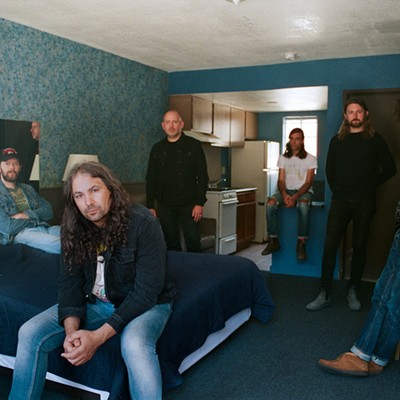
For all the talk of Oklahoma singer-songwriter Parker Millsap and his Pentecostal roots, there’s a point that gets glossed over along the way.
People note that gruff howl of a voice rumbling out of his gut with a tent-revival vigor equal parts fire-and-brimstone and piss-and-vinegar. Millsap himself nods to those Sunday morning sermons (and his fascination with Tom Waits) as the impetus for that, but there was more, deeper still.
For being the product of a then-19-year-old kid, his debut album, Palisade, was incredibly grown up, so serious, a collection of grandpappy-approved, purist Southern folk songs that viewed hooks as unforgivable sins.
He’s viewed as an old soul, and that staunch devotion to making God-fearing music favoring work and worship over play has a lot to do with it.
But then Bruce Springsteen roared into Millsap’s life like the devil in blue jeans.
“For a long time, I was anti-hit. Everything was too mainstream, and I wanted what I did to be poetry, to be this high art. He got me over that,” Millsap said of The Boss. “For one reason or another, I got Nebraska, and I was like, ‘Oh, the guy can write a song.’ Then I tried Born to Run and Born in the U.S.A. out again, and I was kind of knocked out. That fear of writing a catchy song was gone.”
Which isn’t to say you’ll spot Millsap on American Idol anytime soon. Armed with the sort of wholesome good looks of an all-state quarterback, he’d no doubt make a killing on the Mumford circuit of twangy pop stardom if he so desired, but he’s quick to remind you it’s not who he is or what he’s here to do.
Instead, he’s parlaying the wise-beyond-his-years songwriting chops with tight melodic muscle for some of his most gripping songs to date on his new, self-titled album, providing a bridge to classic American music that’s easier for most to cross.
“It’s more produced, the songs are easier to sing along to and the stories are a little more interesting. The songs on Palisade are very self-contained, looking inward. This record reaches out and tries to grab you in a different way,” Millsap said. “It’s comforting to know that people can connect to this.”
Big names in American folk music are buying what Millsap is selling, too.
He caught the eye of Thirty Tigers, a management firm that has worked with the likes of Jason Isbell, Samantha Crain and Turnpike Troubadours and is now distributing Millsap’s new album through his own label, Okrahoma Records.
Thereafter, a live performance of “Truck Stop Gospel” premiered on CMT. He was also profiled in Southern Living, inciting a squeal of excitement from the real housewives of Purcell. After a songwriters in-the-round set with two of the leaders of Old Crow Medicine Show, Millsap was invited to spend a sizable chunk of 2013 opening for the beloved bluegrass group, including a sold-out New Year’s Eve show at the Ryman Auditorium in Nashville, Tenn.
“Those shows were not only the largest crowds but also some of the most attentive crowds,” Millsap said. “For them to have the same reaction that those regulars do at The Deli, it’s like, this is working outside of our home base. It’s not just rooting for the home team … it feels like you are actually starting to go places. A lot of the guys I work with have been in this for a long time and listened to a lot of music; and for whatever reason, what I’m doing pokes through for them a little bit, and that’s comforting.”
In a lot of ways, the next 12 months are only looking up. After a whirlwind 2013, Millsap will hit the road with duo Shovels & Rope and is finalizing a string of dates with folk icon Patty Griffin.
For most 20-year-olds, this would be cause for celebration, but it isn’t for Millsap. He remains forever a humble servant to the music he owes his life to, returning to The Deli each Tuesday night when he’s not out on the road, working to a write a new song a week from his quiet new home in Guthrie and continuing his devotion to spreading the gospel to anyone who will listen.
“Maybe it has something to do with growing up in Oklahoma; it’s kind of our way to roll up our sleeves, do it the hard way,” Millsap said of his largely independent approach to music. “There’s always something to learn, always something out there to do, someone who hasn’t heard it yet. I couldn’t take a break if I wanted to; it’s always there in the back of my head, and I don’t think it will ever go away.”











